人教版(2019)必修 第三册Unit 3 Diverse Cultures复习课件(共51张PPT)
文档属性
| 名称 | 人教版(2019)必修 第三册Unit 3 Diverse Cultures复习课件(共51张PPT) |

|
|
| 格式 | pptx | ||
| 文件大小 | 5.6MB | ||
| 资源类型 | 教案 | ||
| 版本资源 | 人教版(2019) | ||
| 科目 | 英语 | ||
| 更新时间 | 2023-01-11 15:29:00 | ||
图片预览



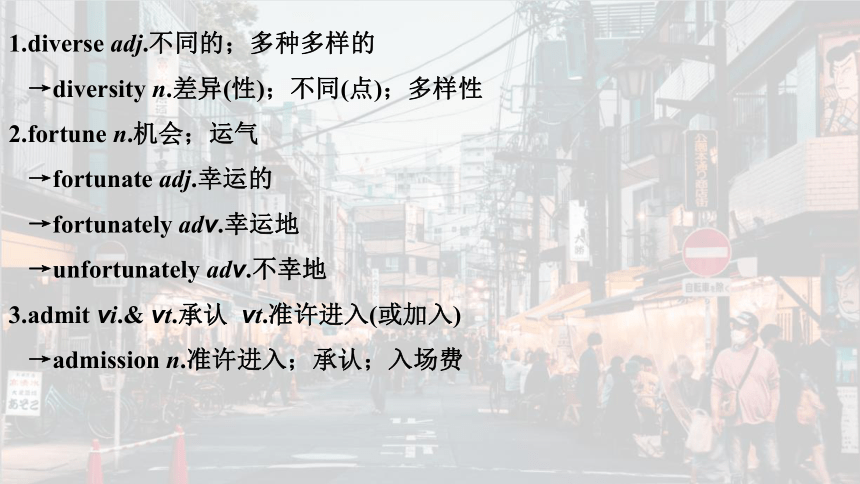

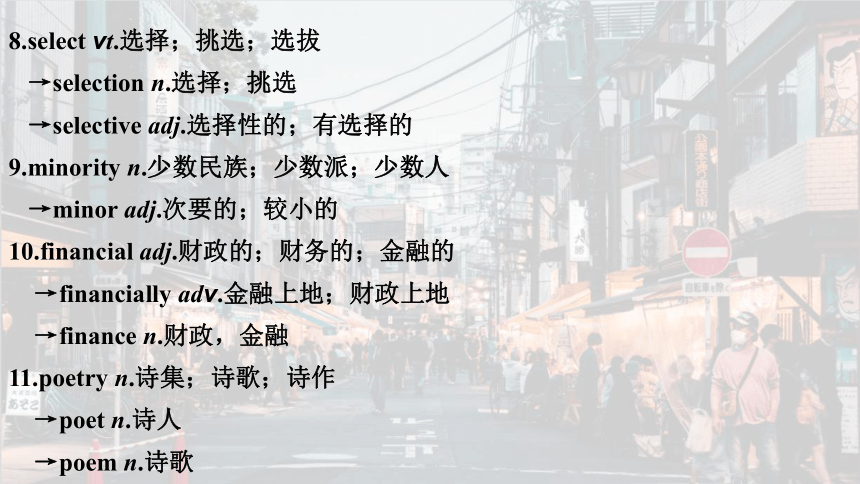
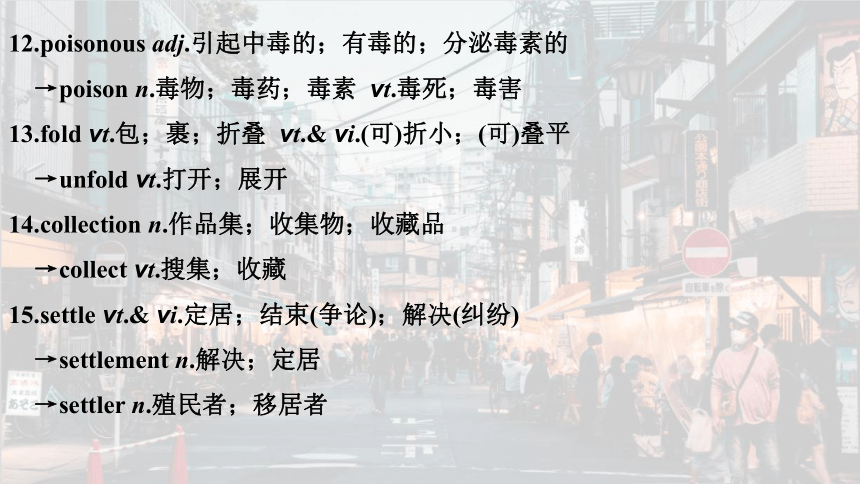
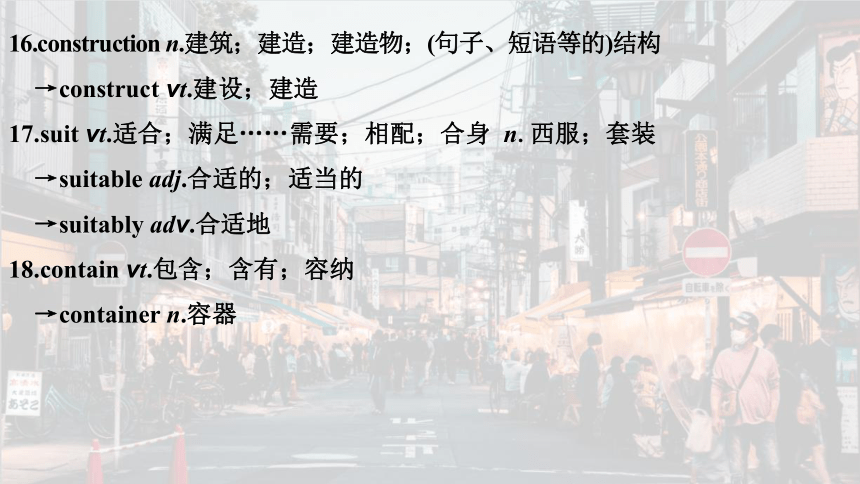

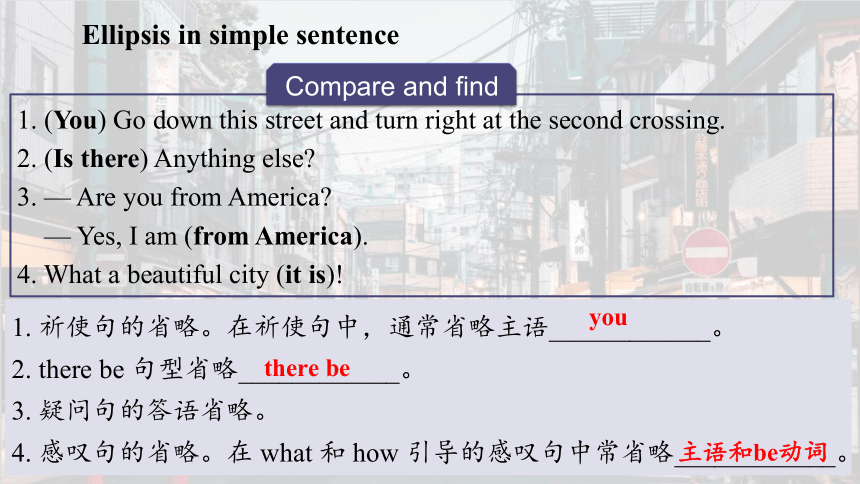
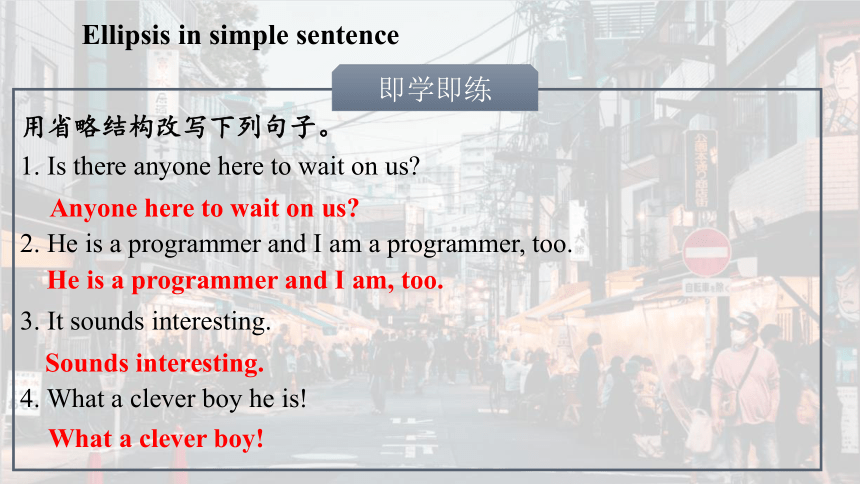
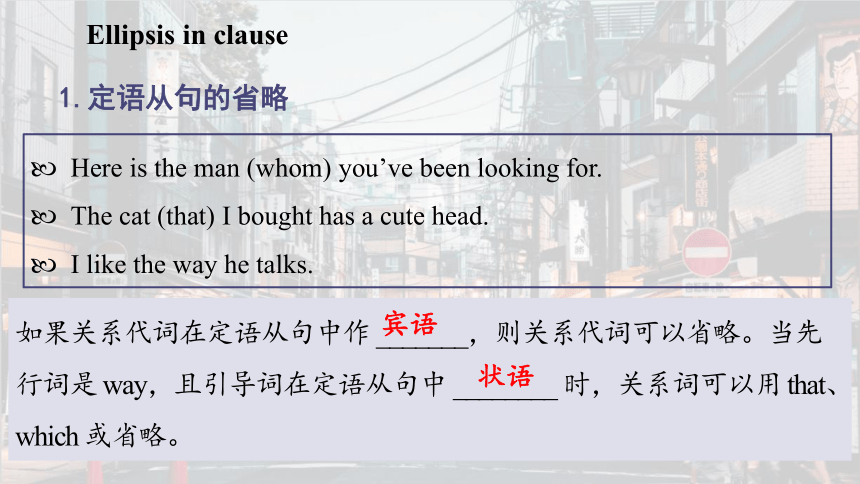
文档简介
(共51张PPT)
必修第三册
Unit 3 Diverse Cultures
壹
贰
叁
肆
单词
语法
语言点
课文短语
目
录
单词
1.diverse adj.不同的;多种多样的
→diversity n.差异(性);不同(点);多样性
2.fortune n.机会;运气
→fortunate adj.幸运的
→fortunately adv.幸运地
→unfortunately adv.不幸地
3.admit vi.& vt.承认 vt.准许进入(或加入)
→admission n.准许进入;承认;入场费
4.occur vi.发生;出现
→occurrence n.发生;发生的事
5.historical adj.(有关)历史的
→history n.历史
→historic adj.有历史意义的;历史性的
6.earn vt.& vi.挣得;赚得;赢得;博得
→earning n.收入;收益
7.immigrant n.(外来)移民;外侨
→immigrate vi.移入;自外国移入
→immigration n.移居入境;移民
8.select vt.选择;挑选;选拔
→selection n.选择;挑选
→selective adj.选择性的;有选择的
9.minority n.少数民族;少数派;少数人
→minor adj.次要的;较小的
10.financial adj.财政的;财务的;金融的
→financially adv.金融上地;财政上地
→finance n.财政,金融
11.poetry n.诗集;诗歌;诗作
→poet n.诗人
→poem n.诗歌
12.poisonous adj.引起中毒的;有毒的;分泌毒素的
→poison n.毒物;毒药;毒素 vt.毒死;毒害
13.fold vt.包;裹;折叠 vt.& vi.(可)折小;(可)叠平
→unfold vt.打开;展开
14.collection n.作品集;收集物;收藏品
→collect vt.搜集;收藏
15.settle vt.& vi.定居;结束(争论);解决(纠纷)
→settlement n.解决;定居
→settler n.殖民者;移居者
16.construction n.建筑;建造;建造物;(句子、短语等的)结构
→construct vt.建设;建造
17.suit vt.适合;满足……需要;相配;合身 n.西服;套装
→suitable adj.合适的;适当的
→suitably adv.合适地
18.contain vt.包含;含有;容纳
→container n.容器
语法
1. (You) Go down this street and turn right at the second crossing.
2. (Is there) Anything else
3. — Are you from America
— Yes, I am (from America).
4. What a beautiful city (it is)!
1. 祈使句的省略。在祈使句中,通常省略主语____________。
2. there be 句型省略____________。
3. 疑问句的答语省略。
4. 感叹句的省略。在 what 和 how 引导的感叹句中常省略____________。
Ellipsis in simple sentence
you
there be
主语和be动词
Compare and find
用省略结构改写下列句子。
1. Is there anyone here to wait on us
2. He is a programmer and I am a programmer, too.
3. It sounds interesting.
4. What a clever boy he is!
即学即练
Ellipsis in simple sentence
Anyone here to wait on us
He is a programmer and I am, too.
Sounds interesting.
What a clever boy!
1.定语从句的省略
Here is the man (whom) you’ve been looking for.
The cat (that) I bought has a cute head.
I like the way he talks.
如果关系代词在定语从句中作 _______,则关系代词可以省略。当先行词是 way,且引导词在定语从句中 ________ 时,关系词可以用 that、which 或省略。
Ellipsis in clause
宾语
状语
2.宾语从句的省略
He said (that) the text was very important and that we should learn it by heart.
I know that a movie star will come to our city but I don’t know when (he will come to our city).
He said (that) the book was very interesting and that (不省略) all the children liked to read it.
Ellipsis in clause
及物动词后接宾语从句时,连接词_______一般可以省略,但如果及物动词后接两个或两个以上由______引导的宾语从句时,那么只有第一个 that 可以省略。
when, where, how 和 why 引导的宾语从句有时可以仅保留引导词。
that
that
3.状语从句的省略
When (the novel is) published, the novel will become one of the best sellers of the year.
Though (they were) tired, they went on working.
He did as (he was) told.
He stood up as if (he were) to say something.
Unless (it is) necessary, you’d better not refer to the dictionary.
Ellipsis in clause
当when, while, if, as if, though, as, until, unless 等连接的状语从句的主语和主句的主语一致,且状语从句中含有 be 动词或从句的主语为 it 时,省略状语从句中的 ______________。
在 than, as 等引导的 __________ 状语从句中常省略某些成分。
主语和 be 动词
比较
用省略结构改写下列复合句。
1. Who is the man whom you were talking to
→ Who is the man ________________________
2. Someone has used my mobile phone, but I don’t know who has used it.
→ Someone has used my mobile phone, but I don’t know ______.
3. When it is heated, a piece of ice will turn into water.
→ ________________, a piece of ice will turn into water.
you were talking to
who
When heated
Ellipsis in clause
即学即练
4. Although he was hard-working, he couldn’t earn enough to support himself.
→ _____________________, he couldn’t earn enough to support himself.
5. He’s the man that you can safely depend on.
→ He’s the man ________________________.
6. They don’t use more water than it is necessary.
→ They don’t use more water _______________.
Although hard-working
you can safely depend on
than necessary
Ellipsis in clause
即学即练
1.定语从句的省略
Here is the man (whom) you’ve been looking for.
The cat (that) I bought has a cute head.
I like the way he talks.
如果关系代词在定语从句中作 _______,则关系代词可以省略。当先行词是 way,且引导词在定语从句中 ________ 时,关系词可以用 that、which 或省略。
Ellipsis in clause
宾语
状语
2.宾语从句的省略
He said (that) the text was very important and that we should learn it by heart.
I know that a movie star will come to our city but I don’t know when (he will come to our city).
He said (that) the book was very interesting and that (不省略) all the children liked to read it.
Ellipsis in clause
及物动词后接宾语从句时,连接词_______一般可以省略,但如果及物动词后接两个或两个以上由______引导的宾语从句时,那么只有第一个 that 可以省略。
when, where, how 和 why 引导的宾语从句有时可以仅保留引导词。
that
that
3.状语从句的省略
When (the novel is) published, the novel will become one of the best sellers of the year.
Though (they were) tired, they went on working.
He did as (he was) told.
He stood up as if (he were) to say something.
Unless (it is) necessary, you’d better not refer to the dictionary.
Ellipsis in clause
当when, while, if, as if, though, as, until, unless 等连接的状语从句的主语和主句的主语一致,且状语从句中含有 be 动词或从句的主语为 it 时,省略状语从句中的 ______________。
在 than, as 等引导的 __________ 状语从句中常省略某些成分。
主语和 be 动词
比较
用省略结构改写下列复合句。
1. Who is the man whom you were talking to
→ Who is the man ________________________
2. Someone has used my mobile phone, but I don’t know who has used it.
→ Someone has used my mobile phone, but I don’t know ______.
3. When it is heated, a piece of ice will turn into water.
→ ________________, a piece of ice will turn into water.
you were talking to
who
When heated
Ellipsis in clause
即学即练
4. Although he was hard-working, he couldn’t earn enough to support himself.
→ _____________________, he couldn’t earn enough to support himself.
5. He’s the man that you can safely depend on.
→ He’s the man ________________________.
6. They don’t use more water than it is necessary.
→ They don’t use more water _______________.
Although hard-working
you can safely depend on
than necessary
Ellipsis in clause
即学即练
1. We insisted that they (should) go with us.
2. It is necessary that we (should) learn more words by heart.
3. Had you come here yesterday, you would have met her.
4. Were I you, I would take his advice.
5. Should there be a letter for me, please keep it in the drawer.
Ellipsis in subjunctive mood
在一坚持 (insist),二命令 (order, command),三建议 (suggest, propose, advise),四要求 (demand, require, request, desire) 等后的宾语从句中,含这些词的派生词的其他主语从句、同位语从句、表语从句,以及 It is strange / natural / necessary / important that ... 从句中常省略 ____________。
虚拟条件句常省略 ______,将 were, had, should 提前构成部分倒装。
if
should
Compare and find
用省略结构改写下列各句。
1. If she were here, she would agree too.
→ __________________, she would agree too.
2. He ordered that we should go out at once.
→ He ordered that ____________________.
3. If Thomas Edison had stored his money, he would have died a wealthy man.
→ _________________________________, he would have died a wealthy man.
Were she here
we go out at once
Had Thomas Edison stored his money
Ellipsis in subjunctive mood
即学即练
1.动词不定式的省略
1. — Will you go with me
— Well, I’d like to (go with you).
2. He didn’t come, but he ought to have (come).
3. I saw him enter the room just now.
= He was seen to enter the room just now by me.
Ellipsis in other situations
有些动词 (词组),如want, wish, expect, hope, would like, try, forget等后面的不定式作______时,为了避免重复,可以省略动词只保留到 _____,但如果在省略的不定式结构中含有系动词 be 和助动词 have,这些动词就要保留。
感官动词 (词组), see, look at, hear, listen to, notice, watch 等和使役动词 make, let, have 等的后面作宾补的不定式要省略 _____;但此类动词用于被动语态时 to 不可省略。
宾语
to
to
1.动词不定式的省略
4. She’d like to take off her coat and have a break.
5. It’s more difficult to do than to say.
做比说难(强调语意前后对比)。
Ellipsis in other situations
在某些句式中,如介词 but,except 前有动词 do 的任何形式,后面的不定式要省略______。
两个或两个以上的不定式并列时,第一个带to,后面省去_____;但如果两个不定式表示对比、对照关系时,则to不可省略。
to
to
2. 介词的省略
1. She spends half an hour (in) doing some reading every day.
2. We have a final exam (in) every term.
3. There is no sense / point (in) doing sth.
4. It is no good / use (in) doing sth.
5. I have trouble understanding this problem.
Ellipsis in other situations
在英语中,一些与动词、名词、形容词搭配的______常被省略,只保留后面的动名词。如 spend time / money (in) doing sth; have difficulty / trouble (in) doing sth; prevent / stop sb (from) doing sth。
表示______的介词 at, on 和 in 在 next, last, this, each, these, yesterday, every, tomorrow 等词之前,一般可以省略。
介词
时间
3. 替代性省略
— Can they finish their work today
— I think so.
— I don’t think so. / I think not.
Ellipsis in other situations
英语中,可以使用so, _____或其他手段来省略上文或问句中的一部分或整个句子。
not
Tips: hope, guess, be afraid 的否定形式只能用 not 的形式,不能用not ... so 的形式。
— The boys are not doing a good job at all, are they
— I guess not.
4. 比较结构的省略
The sooner (you do it), the better (it will be).
(你做得)越快(结果就会)越好。
Many others are doing better than we are (doing).
Ellipsis in other situations
在“the + 比较级,the + 比较级”结构中和由_________和as引导的比较句式中,常会有一些成分在上下文清楚的情况下被省略。
than
语言点
seek/try one’s fortune找出路;碰运气
make a fortune发财;赚钱
have the good fortune to do sth. 有幸做某事
be fortunate to do sth. /in doing sth. 有幸做某事
n.机会;运气;大笔的钱;财富;命运 [fortunate adj.幸运的;侥幸的(=lucky) fortunately adv.幸运地(=luckily)]
1
fortune
(1)Many immigrants headed to California to seek their (fortunate) but ended up doing diverse odd jobs to earn a living.
fortune
(2)他决定到市区去碰碰运气,看看能不能发财。他有幸得到了市长的帮助,并且幸运地成功开办了自己的公司。
He decided to downtown to see _________________
.He get the help of the mayor and successfully started his own business .
seek/try his fortune
if/whether he could
make a fortune
had the fortune to/was fortunate to
fortunately/luckily
be admitted into/to被录取;被接收
admit doing sth. /having done sth. 承认做过某事
admit that...承认……
admit sb. /sth. to be+adj./n.承认某人/某物(事)为……
v.承认;准许进入(或加入);接纳;可容纳 (admission n.准许进入;承认;入场费)
2
admit
(1)It is said that (admit) to the concert is £5 and as a result,I determine to enjoy it.
(2) Afterwards,he had to admit (put) some poisonous mushrooms in the soup.
admission
putting/having put
(3)得知你已被北京大学录取,我写信真诚地祝贺你。(应用文写作之祝贺信)
,I am writing to offer sincere congratulations to you.
(4)即将到来的汉语演讲比赛被认为是外国人提高汉语口语的好机会。
(2020·1月浙江,应用文写作)
The upcoming Chinese speech contest ______________________________
.
Learning that you have been admitted into/to Peking University
is admitted to be a good chance for
foreigners to improve their oral Chinese
occur to sb. 某人突然想到;想起
It occurs to sb. that.../to do...某人突然想到……
vi.(occurred,occurred,occurring)发生;出现
3
occur
(1)A good idea occurred me that I could go downtown to buy some souvenirs after the mission.
to
(2)妈妈突然想起她把帐篷落在我们前一天晚上住的旅馆里了。
she had left the tent in the hotel where we stayed the night before.
用法点拨 ①occur没有被动语态,不用于进行时。occur作谓语时,主语不能是人。②表示“某人突然想到……”的常用句型还有:It strikes sb. that.../It hits sb. that...
It occurred to/struck/hit Mother that
escape from从……逃脱,从……逃跑
escape (doing) sth. 避开(做)某事
escape being done sth. 逃避(被)做某事
have a narrow escape死里逃生
v.逃脱;逃走;泄漏;避开;被忘掉
n.逃跑;逃脱;解脱
4
escape
(1)Only a minority of students want to escape (take) the responsibility for their own behavior.
taking
(2)It was claimed that a prisoner had escaped the prison,which shocked the public.
(3)最后,我们九死一生,幸运地没有被那头饥饿的北极熊伤害到。
(2020·7月浙江,读后续写)
____________________________________________________________________________________
from
At last,we had a narrow escape,fortunately escaping being hurt by the hungry polar bear.
settle down (使)安定;安居;平静下来;舒适地坐下/躺下
settle in/into安顿下来;习惯于;适应
settle down to (doing) sth. 开始认真(做)某事
vi.定居;安家 vt.使定居;(使)平静下来;安排;解决 (settlement n.定居点;协议;解决settler n.移居者;殖民者)
5
settle
(1)得知你每天有许多的问题要解决,我建议你开始认真考虑哪个问题是最紧急的。(应用文写作之建议信)
Learning that ,I suggest that which one is the most urgent.
(2)他们冲下车,搭起帐篷,舒适地坐在草地上,欣赏着周围惊人的景象。(读后续写之动作链描写)
They dashed out of the car,put up the tent and ,enjoying the surrounding breathtaking sights.
you have so many problems to settle every day
you (should) settle down to considering
settled down on the grass
bring up抚养;培养;教育;提出;呕吐
bring in引进;获利;赚钱
bring out出版;使显现
bring down使倒下;减少;降低
bring back把……带回来;使回忆起;使恢复
引起;导致
6
bring about
用bring短语的适当形式填空
(1)I don’t clearly remember who the question but remember it definitely a heated discussion.
(2)The reason why diverse goods are sold at such a low price is that the manufacturers are willing to the price in return for big volume purchases.
(3)The picture often to me series of happy memories of my high school days.
(4)The idea he two months ago has a lot more money for the company.
(5)As a teacher,I have the fortune to the best in my students.
brought up
brought about
bring down
brings back
brought up
brought in
bring out
句中many sitting on top of big hills是独立主格结构,可表示谓语动
作发生的时间、原因、条件或伴随情况等,在许多情况下相当于一
个状语从句或并列句。
独立主格结构的构成:n./pron.+v.-ing/v.-ed/to do/adj./adv./n./prep.
There are so many beautiful old buildings—many sitting on top of big hills,...有众多美丽的古建筑——好多都坐落于大山之巅,……
7
独立主格结构
(1)我紧张地看着爸爸,双腿颤抖着,心狂跳着。(n.+v.-ing)(读后续写之心理描写)
I looked at my father nervously,__________________________________
.
(2)买了她想要的所有东西后,她高兴地回家了,她那只可爱的小狗跟在身后。(n.+v.-ed)
,she returned home happily,followed by her lovely dog.
(3)暑假结束了,我们兴奋地返回了学校。(n.+adv.)
,we returned to school excitedly.
my legs trembling and my heart beating
wildly
All the things she wanted bought
The summer vacation over
what引导名词性从句时,在从句中充当句子成分(主要作主语、表语和宾语)。可以译成多种意思:……的东西或事情;……的人或样子;……的数量或数目;……的时间;……的地方等。
What started as a residential area for Chinese immigrants then turned into a centre for Chinese culture.早先作为中国移民的住宅区的地方后来变成了中华文化的中心。
8
what引导名词性从句
(1)让我印象最为深刻的是她独特的教学方法。(2020·全国Ⅰ,书面表达)
was her unique teaching method.
(2)一个新体育馆在曾经的荒地上建了起来。
A new stadium was built on .
(3)你应该关注的是整个句子而不是每一个单词的意思。(应用文写作之建议信)
is the meaning of the whole sentence rather than every single word.
What impressed me most
what used to be a wasteland
What you should focus on
(4)关键问题是我们对在线学习应持有什么样的态度。
(2021·全国乙,书面表达)
The key problem is .
(5)我们不知道我们应该做些什么来使我们抑郁的爱犬高兴起来。
(2020·1月浙江,读后续写)
We had no idea .
what kind of attitude we should hold to online learning
what we should do to cheer our gloomy beloved pet dog up
课文短语
1 travel journal
2 be influenced by
3 head to sp
4 gold rush
5 seek one’s fortune
6 earn a / one’s living
7 open up
8 bring about
9 apart from
10 be home to
11 escape (doing) sth
受……影响
前往某地
淘金热
寻找出路;寻找致富之路
谋生
打开;开张;开业
产生;带来;导致
旅行日志
除了
是……的发源地
摆脱 / 逃脱(做)某事
1 settle in
2 start as
3 turn into
4 a real taste of
5 take care to do sth
6 to name but a few
7 spend time (in) doing
在……定居
转变成
真正的体验
注意做某事
列举几个例子
花费时间做某事
Language points: Important phrases (P32 ~ P33)
从……开始
8 a range of
9 varieties of
10 suit everyone’s taste
11 be located in / on
12 be divided up into
13 has a history of
14 has a population of
15 give feedback on sth
适合每个人的口味
分成
有……时间历史
有……人口
对……做出反馈
Language points: Important phrases (P32 ~ 33)
位于
各种各样的
一系列
谢谢聆听
必修第三册
Unit 3 Diverse Cultures
壹
贰
叁
肆
单词
语法
语言点
课文短语
目
录
单词
1.diverse adj.不同的;多种多样的
→diversity n.差异(性);不同(点);多样性
2.fortune n.机会;运气
→fortunate adj.幸运的
→fortunately adv.幸运地
→unfortunately adv.不幸地
3.admit vi.& vt.承认 vt.准许进入(或加入)
→admission n.准许进入;承认;入场费
4.occur vi.发生;出现
→occurrence n.发生;发生的事
5.historical adj.(有关)历史的
→history n.历史
→historic adj.有历史意义的;历史性的
6.earn vt.& vi.挣得;赚得;赢得;博得
→earning n.收入;收益
7.immigrant n.(外来)移民;外侨
→immigrate vi.移入;自外国移入
→immigration n.移居入境;移民
8.select vt.选择;挑选;选拔
→selection n.选择;挑选
→selective adj.选择性的;有选择的
9.minority n.少数民族;少数派;少数人
→minor adj.次要的;较小的
10.financial adj.财政的;财务的;金融的
→financially adv.金融上地;财政上地
→finance n.财政,金融
11.poetry n.诗集;诗歌;诗作
→poet n.诗人
→poem n.诗歌
12.poisonous adj.引起中毒的;有毒的;分泌毒素的
→poison n.毒物;毒药;毒素 vt.毒死;毒害
13.fold vt.包;裹;折叠 vt.& vi.(可)折小;(可)叠平
→unfold vt.打开;展开
14.collection n.作品集;收集物;收藏品
→collect vt.搜集;收藏
15.settle vt.& vi.定居;结束(争论);解决(纠纷)
→settlement n.解决;定居
→settler n.殖民者;移居者
16.construction n.建筑;建造;建造物;(句子、短语等的)结构
→construct vt.建设;建造
17.suit vt.适合;满足……需要;相配;合身 n.西服;套装
→suitable adj.合适的;适当的
→suitably adv.合适地
18.contain vt.包含;含有;容纳
→container n.容器
语法
1. (You) Go down this street and turn right at the second crossing.
2. (Is there) Anything else
3. — Are you from America
— Yes, I am (from America).
4. What a beautiful city (it is)!
1. 祈使句的省略。在祈使句中,通常省略主语____________。
2. there be 句型省略____________。
3. 疑问句的答语省略。
4. 感叹句的省略。在 what 和 how 引导的感叹句中常省略____________。
Ellipsis in simple sentence
you
there be
主语和be动词
Compare and find
用省略结构改写下列句子。
1. Is there anyone here to wait on us
2. He is a programmer and I am a programmer, too.
3. It sounds interesting.
4. What a clever boy he is!
即学即练
Ellipsis in simple sentence
Anyone here to wait on us
He is a programmer and I am, too.
Sounds interesting.
What a clever boy!
1.定语从句的省略
Here is the man (whom) you’ve been looking for.
The cat (that) I bought has a cute head.
I like the way he talks.
如果关系代词在定语从句中作 _______,则关系代词可以省略。当先行词是 way,且引导词在定语从句中 ________ 时,关系词可以用 that、which 或省略。
Ellipsis in clause
宾语
状语
2.宾语从句的省略
He said (that) the text was very important and that we should learn it by heart.
I know that a movie star will come to our city but I don’t know when (he will come to our city).
He said (that) the book was very interesting and that (不省略) all the children liked to read it.
Ellipsis in clause
及物动词后接宾语从句时,连接词_______一般可以省略,但如果及物动词后接两个或两个以上由______引导的宾语从句时,那么只有第一个 that 可以省略。
when, where, how 和 why 引导的宾语从句有时可以仅保留引导词。
that
that
3.状语从句的省略
When (the novel is) published, the novel will become one of the best sellers of the year.
Though (they were) tired, they went on working.
He did as (he was) told.
He stood up as if (he were) to say something.
Unless (it is) necessary, you’d better not refer to the dictionary.
Ellipsis in clause
当when, while, if, as if, though, as, until, unless 等连接的状语从句的主语和主句的主语一致,且状语从句中含有 be 动词或从句的主语为 it 时,省略状语从句中的 ______________。
在 than, as 等引导的 __________ 状语从句中常省略某些成分。
主语和 be 动词
比较
用省略结构改写下列复合句。
1. Who is the man whom you were talking to
→ Who is the man ________________________
2. Someone has used my mobile phone, but I don’t know who has used it.
→ Someone has used my mobile phone, but I don’t know ______.
3. When it is heated, a piece of ice will turn into water.
→ ________________, a piece of ice will turn into water.
you were talking to
who
When heated
Ellipsis in clause
即学即练
4. Although he was hard-working, he couldn’t earn enough to support himself.
→ _____________________, he couldn’t earn enough to support himself.
5. He’s the man that you can safely depend on.
→ He’s the man ________________________.
6. They don’t use more water than it is necessary.
→ They don’t use more water _______________.
Although hard-working
you can safely depend on
than necessary
Ellipsis in clause
即学即练
1.定语从句的省略
Here is the man (whom) you’ve been looking for.
The cat (that) I bought has a cute head.
I like the way he talks.
如果关系代词在定语从句中作 _______,则关系代词可以省略。当先行词是 way,且引导词在定语从句中 ________ 时,关系词可以用 that、which 或省略。
Ellipsis in clause
宾语
状语
2.宾语从句的省略
He said (that) the text was very important and that we should learn it by heart.
I know that a movie star will come to our city but I don’t know when (he will come to our city).
He said (that) the book was very interesting and that (不省略) all the children liked to read it.
Ellipsis in clause
及物动词后接宾语从句时,连接词_______一般可以省略,但如果及物动词后接两个或两个以上由______引导的宾语从句时,那么只有第一个 that 可以省略。
when, where, how 和 why 引导的宾语从句有时可以仅保留引导词。
that
that
3.状语从句的省略
When (the novel is) published, the novel will become one of the best sellers of the year.
Though (they were) tired, they went on working.
He did as (he was) told.
He stood up as if (he were) to say something.
Unless (it is) necessary, you’d better not refer to the dictionary.
Ellipsis in clause
当when, while, if, as if, though, as, until, unless 等连接的状语从句的主语和主句的主语一致,且状语从句中含有 be 动词或从句的主语为 it 时,省略状语从句中的 ______________。
在 than, as 等引导的 __________ 状语从句中常省略某些成分。
主语和 be 动词
比较
用省略结构改写下列复合句。
1. Who is the man whom you were talking to
→ Who is the man ________________________
2. Someone has used my mobile phone, but I don’t know who has used it.
→ Someone has used my mobile phone, but I don’t know ______.
3. When it is heated, a piece of ice will turn into water.
→ ________________, a piece of ice will turn into water.
you were talking to
who
When heated
Ellipsis in clause
即学即练
4. Although he was hard-working, he couldn’t earn enough to support himself.
→ _____________________, he couldn’t earn enough to support himself.
5. He’s the man that you can safely depend on.
→ He’s the man ________________________.
6. They don’t use more water than it is necessary.
→ They don’t use more water _______________.
Although hard-working
you can safely depend on
than necessary
Ellipsis in clause
即学即练
1. We insisted that they (should) go with us.
2. It is necessary that we (should) learn more words by heart.
3. Had you come here yesterday, you would have met her.
4. Were I you, I would take his advice.
5. Should there be a letter for me, please keep it in the drawer.
Ellipsis in subjunctive mood
在一坚持 (insist),二命令 (order, command),三建议 (suggest, propose, advise),四要求 (demand, require, request, desire) 等后的宾语从句中,含这些词的派生词的其他主语从句、同位语从句、表语从句,以及 It is strange / natural / necessary / important that ... 从句中常省略 ____________。
虚拟条件句常省略 ______,将 were, had, should 提前构成部分倒装。
if
should
Compare and find
用省略结构改写下列各句。
1. If she were here, she would agree too.
→ __________________, she would agree too.
2. He ordered that we should go out at once.
→ He ordered that ____________________.
3. If Thomas Edison had stored his money, he would have died a wealthy man.
→ _________________________________, he would have died a wealthy man.
Were she here
we go out at once
Had Thomas Edison stored his money
Ellipsis in subjunctive mood
即学即练
1.动词不定式的省略
1. — Will you go with me
— Well, I’d like to (go with you).
2. He didn’t come, but he ought to have (come).
3. I saw him enter the room just now.
= He was seen to enter the room just now by me.
Ellipsis in other situations
有些动词 (词组),如want, wish, expect, hope, would like, try, forget等后面的不定式作______时,为了避免重复,可以省略动词只保留到 _____,但如果在省略的不定式结构中含有系动词 be 和助动词 have,这些动词就要保留。
感官动词 (词组), see, look at, hear, listen to, notice, watch 等和使役动词 make, let, have 等的后面作宾补的不定式要省略 _____;但此类动词用于被动语态时 to 不可省略。
宾语
to
to
1.动词不定式的省略
4. She’d like to take off her coat and have a break.
5. It’s more difficult to do than to say.
做比说难(强调语意前后对比)。
Ellipsis in other situations
在某些句式中,如介词 but,except 前有动词 do 的任何形式,后面的不定式要省略______。
两个或两个以上的不定式并列时,第一个带to,后面省去_____;但如果两个不定式表示对比、对照关系时,则to不可省略。
to
to
2. 介词的省略
1. She spends half an hour (in) doing some reading every day.
2. We have a final exam (in) every term.
3. There is no sense / point (in) doing sth.
4. It is no good / use (in) doing sth.
5. I have trouble understanding this problem.
Ellipsis in other situations
在英语中,一些与动词、名词、形容词搭配的______常被省略,只保留后面的动名词。如 spend time / money (in) doing sth; have difficulty / trouble (in) doing sth; prevent / stop sb (from) doing sth。
表示______的介词 at, on 和 in 在 next, last, this, each, these, yesterday, every, tomorrow 等词之前,一般可以省略。
介词
时间
3. 替代性省略
— Can they finish their work today
— I think so.
— I don’t think so. / I think not.
Ellipsis in other situations
英语中,可以使用so, _____或其他手段来省略上文或问句中的一部分或整个句子。
not
Tips: hope, guess, be afraid 的否定形式只能用 not 的形式,不能用not ... so 的形式。
— The boys are not doing a good job at all, are they
— I guess not.
4. 比较结构的省略
The sooner (you do it), the better (it will be).
(你做得)越快(结果就会)越好。
Many others are doing better than we are (doing).
Ellipsis in other situations
在“the + 比较级,the + 比较级”结构中和由_________和as引导的比较句式中,常会有一些成分在上下文清楚的情况下被省略。
than
语言点
seek/try one’s fortune找出路;碰运气
make a fortune发财;赚钱
have the good fortune to do sth. 有幸做某事
be fortunate to do sth. /in doing sth. 有幸做某事
n.机会;运气;大笔的钱;财富;命运 [fortunate adj.幸运的;侥幸的(=lucky) fortunately adv.幸运地(=luckily)]
1
fortune
(1)Many immigrants headed to California to seek their (fortunate) but ended up doing diverse odd jobs to earn a living.
fortune
(2)他决定到市区去碰碰运气,看看能不能发财。他有幸得到了市长的帮助,并且幸运地成功开办了自己的公司。
He decided to downtown to see _________________
.He get the help of the mayor and successfully started his own business .
seek/try his fortune
if/whether he could
make a fortune
had the fortune to/was fortunate to
fortunately/luckily
be admitted into/to被录取;被接收
admit doing sth. /having done sth. 承认做过某事
admit that...承认……
admit sb. /sth. to be+adj./n.承认某人/某物(事)为……
v.承认;准许进入(或加入);接纳;可容纳 (admission n.准许进入;承认;入场费)
2
admit
(1)It is said that (admit) to the concert is £5 and as a result,I determine to enjoy it.
(2) Afterwards,he had to admit (put) some poisonous mushrooms in the soup.
admission
putting/having put
(3)得知你已被北京大学录取,我写信真诚地祝贺你。(应用文写作之祝贺信)
,I am writing to offer sincere congratulations to you.
(4)即将到来的汉语演讲比赛被认为是外国人提高汉语口语的好机会。
(2020·1月浙江,应用文写作)
The upcoming Chinese speech contest ______________________________
.
Learning that you have been admitted into/to Peking University
is admitted to be a good chance for
foreigners to improve their oral Chinese
occur to sb. 某人突然想到;想起
It occurs to sb. that.../to do...某人突然想到……
vi.(occurred,occurred,occurring)发生;出现
3
occur
(1)A good idea occurred me that I could go downtown to buy some souvenirs after the mission.
to
(2)妈妈突然想起她把帐篷落在我们前一天晚上住的旅馆里了。
she had left the tent in the hotel where we stayed the night before.
用法点拨 ①occur没有被动语态,不用于进行时。occur作谓语时,主语不能是人。②表示“某人突然想到……”的常用句型还有:It strikes sb. that.../It hits sb. that...
It occurred to/struck/hit Mother that
escape from从……逃脱,从……逃跑
escape (doing) sth. 避开(做)某事
escape being done sth. 逃避(被)做某事
have a narrow escape死里逃生
v.逃脱;逃走;泄漏;避开;被忘掉
n.逃跑;逃脱;解脱
4
escape
(1)Only a minority of students want to escape (take) the responsibility for their own behavior.
taking
(2)It was claimed that a prisoner had escaped the prison,which shocked the public.
(3)最后,我们九死一生,幸运地没有被那头饥饿的北极熊伤害到。
(2020·7月浙江,读后续写)
____________________________________________________________________________________
from
At last,we had a narrow escape,fortunately escaping being hurt by the hungry polar bear.
settle down (使)安定;安居;平静下来;舒适地坐下/躺下
settle in/into安顿下来;习惯于;适应
settle down to (doing) sth. 开始认真(做)某事
vi.定居;安家 vt.使定居;(使)平静下来;安排;解决 (settlement n.定居点;协议;解决settler n.移居者;殖民者)
5
settle
(1)得知你每天有许多的问题要解决,我建议你开始认真考虑哪个问题是最紧急的。(应用文写作之建议信)
Learning that ,I suggest that which one is the most urgent.
(2)他们冲下车,搭起帐篷,舒适地坐在草地上,欣赏着周围惊人的景象。(读后续写之动作链描写)
They dashed out of the car,put up the tent and ,enjoying the surrounding breathtaking sights.
you have so many problems to settle every day
you (should) settle down to considering
settled down on the grass
bring up抚养;培养;教育;提出;呕吐
bring in引进;获利;赚钱
bring out出版;使显现
bring down使倒下;减少;降低
bring back把……带回来;使回忆起;使恢复
引起;导致
6
bring about
用bring短语的适当形式填空
(1)I don’t clearly remember who the question but remember it definitely a heated discussion.
(2)The reason why diverse goods are sold at such a low price is that the manufacturers are willing to the price in return for big volume purchases.
(3)The picture often to me series of happy memories of my high school days.
(4)The idea he two months ago has a lot more money for the company.
(5)As a teacher,I have the fortune to the best in my students.
brought up
brought about
bring down
brings back
brought up
brought in
bring out
句中many sitting on top of big hills是独立主格结构,可表示谓语动
作发生的时间、原因、条件或伴随情况等,在许多情况下相当于一
个状语从句或并列句。
独立主格结构的构成:n./pron.+v.-ing/v.-ed/to do/adj./adv./n./prep.
There are so many beautiful old buildings—many sitting on top of big hills,...有众多美丽的古建筑——好多都坐落于大山之巅,……
7
独立主格结构
(1)我紧张地看着爸爸,双腿颤抖着,心狂跳着。(n.+v.-ing)(读后续写之心理描写)
I looked at my father nervously,__________________________________
.
(2)买了她想要的所有东西后,她高兴地回家了,她那只可爱的小狗跟在身后。(n.+v.-ed)
,she returned home happily,followed by her lovely dog.
(3)暑假结束了,我们兴奋地返回了学校。(n.+adv.)
,we returned to school excitedly.
my legs trembling and my heart beating
wildly
All the things she wanted bought
The summer vacation over
what引导名词性从句时,在从句中充当句子成分(主要作主语、表语和宾语)。可以译成多种意思:……的东西或事情;……的人或样子;……的数量或数目;……的时间;……的地方等。
What started as a residential area for Chinese immigrants then turned into a centre for Chinese culture.早先作为中国移民的住宅区的地方后来变成了中华文化的中心。
8
what引导名词性从句
(1)让我印象最为深刻的是她独特的教学方法。(2020·全国Ⅰ,书面表达)
was her unique teaching method.
(2)一个新体育馆在曾经的荒地上建了起来。
A new stadium was built on .
(3)你应该关注的是整个句子而不是每一个单词的意思。(应用文写作之建议信)
is the meaning of the whole sentence rather than every single word.
What impressed me most
what used to be a wasteland
What you should focus on
(4)关键问题是我们对在线学习应持有什么样的态度。
(2021·全国乙,书面表达)
The key problem is .
(5)我们不知道我们应该做些什么来使我们抑郁的爱犬高兴起来。
(2020·1月浙江,读后续写)
We had no idea .
what kind of attitude we should hold to online learning
what we should do to cheer our gloomy beloved pet dog up
课文短语
1 travel journal
2 be influenced by
3 head to sp
4 gold rush
5 seek one’s fortune
6 earn a / one’s living
7 open up
8 bring about
9 apart from
10 be home to
11 escape (doing) sth
受……影响
前往某地
淘金热
寻找出路;寻找致富之路
谋生
打开;开张;开业
产生;带来;导致
旅行日志
除了
是……的发源地
摆脱 / 逃脱(做)某事
1 settle in
2 start as
3 turn into
4 a real taste of
5 take care to do sth
6 to name but a few
7 spend time (in) doing
在……定居
转变成
真正的体验
注意做某事
列举几个例子
花费时间做某事
Language points: Important phrases (P32 ~ P33)
从……开始
8 a range of
9 varieties of
10 suit everyone’s taste
11 be located in / on
12 be divided up into
13 has a history of
14 has a population of
15 give feedback on sth
适合每个人的口味
分成
有……时间历史
有……人口
对……做出反馈
Language points: Important phrases (P32 ~ 33)
位于
各种各样的
一系列
谢谢聆听
